    |
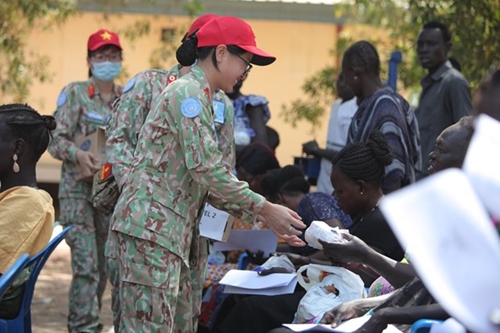 |
|
Doctor Tong Van Anh - Head of the Women Team and her Vietnamese female soldiers in the team present gifts to local women in South Sudan. (Photo courtesy of Level-2 Field Hospital Rotation 3) |
For women with young children, like soldier Bach Thi Huyen Trang, one of 13 female soldiers at the Level-2 Field Hospital Rotation 3 in Bentiu, South Sudan, living and working far from home for a long period of time has been a major challenge, especially during the COVID-19 pandemic.
“Not long ago, when the pandemic was very complicated in Hanoi, my father-in-law became sick and had to be hospitalized,” Trang explained. “My two young children had to be cared for by relatives, because my husband often goes on long business trips.”
The young mother has had many anxious days, and talking to her children over the phone has been the only source of relief.
In her job as a medical hygiene worker at the hospital, Trang also faces many challenges.
Medical waste from all five Level-1 field hospitals in the region is destroyed at her hospital. “During the COVID-19 outbreak, it was extremely important to destroy infectious waste in accordance with regulations and to ensure safety, because the volume of infectious waste increased dramatically,” Trang said.
“There were days when the weather was extremely hot, at up to 45 degrees Celsius, and many of us suffered from heatstroke. Our health was also affected after inhaling smoke from the incinerator.”
For Dr. Tong Van Anh, Secretary of the Level-2 Field Hospital Rotation 3’s Youth Union Organization and Head of the hospital’s Women’s Team, the working environment was really difficult, in particular the lack of clean water, which greatly affects daily life and patient care.
    |
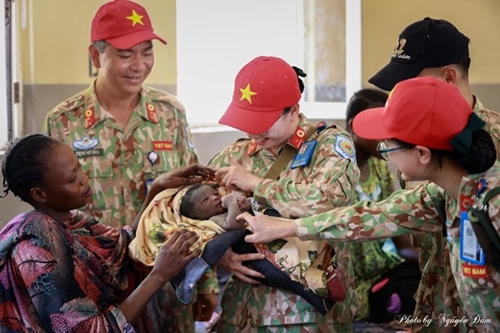 |
|
Nurses and doctors of Vietnam’s Level-2 Field Hospital Rotation 3 visit the Obstetrics Department - Bentiu General Hospital. (Photo courtesy of Level-2 Field Hospital Rotation 3) |
As an obstetrician and gynecologist, Dr. Van Anh understands the importance of reproductive health for women. Many South Sudanese women, however, have no knowledge of the issue. She has therefore taken part in programs to help local women understand the need to protect their reproductive health.
Although her efforts have not immediately changed perceptions, she nonetheless left a very good impression on the local community.
She shared one particular memory, when she and her surgical team successfully performed a caesarean section for a 22-year-old South Sudanese woman with a severe spinal deformity.
“Joy broke out when the baby was born healthy, and the mother recovered well after the procedure,” the doctor recalled.
    |
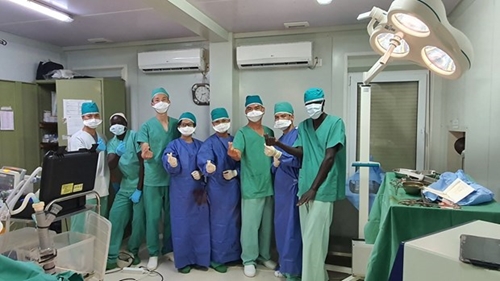 |
|
Doctor Tong Van Anh (fourth from the left) and her team after successfully performing a caesarean section for a South Sudanese woman with kyphosis (Photo courtesy of Level-2 Field Hospital Rotation 3) |
Meanwhile, for Second Lieutenant Le Na, aged 26 and the youngest soldier at the hospital, in addition to her professional work as a diagnostic imaging technician at the hospital’s Department of Medical Examinations, she and her female comrades also voluntarily performed jobs normally done by male soldiers, such as guard duty.
“After many of our male soldiers were infected with COVID-19, I and many other female soldiers in the unit took on guard duty while taking care of our sick comrades,” she said.
Faced with a string of difficulties and challenges, female Vietnamese soldiers have made great efforts to complete their mission and adapt to life in the faraway African land.
Like Trang, who has overcome homesickness to not only successfully complete her tasks but also take on other work. Whenever she has time, she takes care of the unit’s vegetable garden, from planting to watering, while creating a clean and attractive setting.
Na and her teammates, meanwhile, joined efforts to promote Vietnamese culture among foreign friends in the peacekeeping mission.
    |
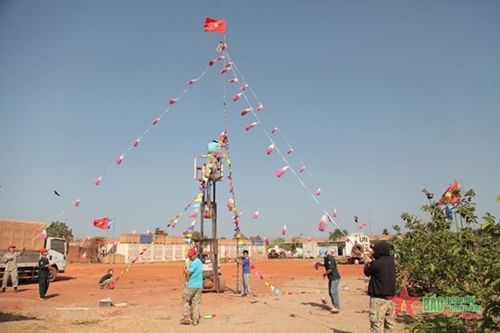 |
|
Vietnamese staff members of Level-2 Field Hospital Rotation 3 in South Sudan erect the Neu (New Year) Pole. (Photo: qdnd.vn) |
During the recent lunar New Year (Tet) holiday, she and other Vietnamese soldiers organized a number of activities in celebration, such as making “Banh Chung” and “Banh Tet,” planting a “Cay Neu” (Neu Pole), and making jam and other traditional Tet delights.
“We also taught some of our foreign colleagues how to make “Banh Chung” and “Banh Tet” and explained the meaning of traditional Tet dishes,” Na added.
“They were all quite excited. Some asked for cakes to take back home as gifts.”
The female Vietnamese soldiers, through their actions, impressed their foreign colleagues and boosted the image of Vietnamese women and Vietnam as an industrious, hard-working, and benevolent nation rich in tradition.
    |
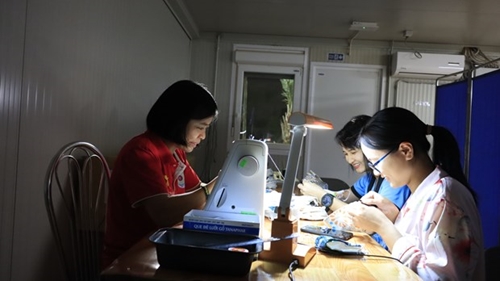 |
|
Female soldiers of Level-2 Field Hospital’s Women Team sew cloth masks as gifts for local women and international friends. (Photo courtesy of Level-2 Field Hospital Rotation 3) |
Lieutenant Colonel Trinh My Hoa, Director of the Level-2 Field Hospital Rotation 3, said the presence of female soldiers in the unit plays an important role in Vietnam’s efforts in South Sudan.
“Our female soldiers not only perform well in their professional duties but also introduce the beauty and image of Vietnamese women to international friends through various activities, including medical examinations and treatment, cultural exchanges, and how they go about daily life,” she said.
The female Vietnamese soldiers believe that bringing happiness to others is also bringing happiness to themselves. These women truly are “Vietnamese roses” in a remote African land full of sunshine and wind.
Source: VNA